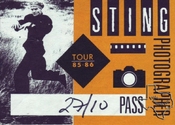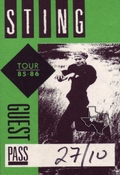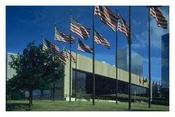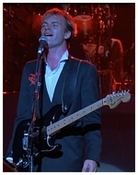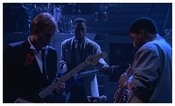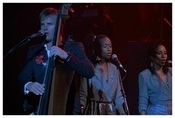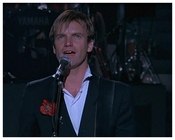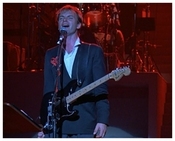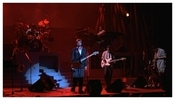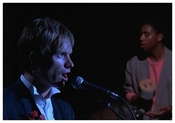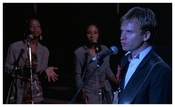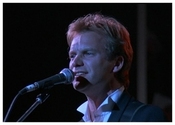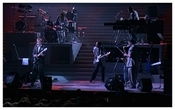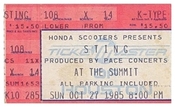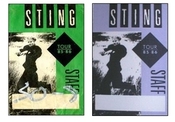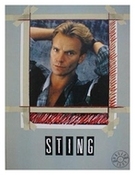
Sting's jazzy winds of change a fresh breath for pop music...
It was a stormy Sunday, but no gale howled stronger than the winds of change that blew over the boundaries of pop music inside at The Summit.
Gordon Matthew Sumner, a.k.a. Sting, bassist/songwriter/vocalist of the Police and quintessential pop star for the '80s, brought his new band of jazz-makers to Houston on his 'Dream of the Blue Turtles' tour, and broke down racial and musical barriers in a bold move that should cast a major ripple-effect over contemporary music.
Rock fans might call it jazz; the jazz community would call it pop, or rock.
And they'd all be correct.
Following the Police's last tour and the success of their 'Synchronicity' album Sting, looking to branch out artistically but at the same time not calling a permanent end to the Police, sent out word to the jazz community that he was looking for players for an album and tour. Following ''auditions'' in Barbados, early rehearsals were so encouraging a feature-length film of the project was commissioned. Titled 'Bring On The Night', it will open in Houston in November.
From Wynton Marsalis' band, considered one of the hottest in contemporary jazz, came younger brother and saxophonist Branford Marsalis and keyboardist Kenny Kirkland. Weather Report drummer Omar Hakim (that band, too, is not officially over), who turned in one of the fiercest solos Sunday night I'd ever heard, was recruited following loads of session work with such pop figures as Bryan Ferry and David Bowie. Bassist Darryl Jones came over from Miles Davis' band. Background vocalists Dolette McDonald and Janice Pendarvis have sung and toured with, respectively, Talking Heads and Laurie Anderson.
That the entire ensemble is black, organized by the blond-haired Sting, was not exactly planned. Call it a happy coincidence. The eclectic mix, fueled by the fact that Sting is English and the others American, planted the seeds for a wild harvest.
As the film documents, Sting and Co. rehearsed about 10 days in France and kicked off their tour in Paris five months ago. Following the U.S. leg they will return to Europe.
Sting is the new breed of pop star - in control. He plans his moves. He stars in film. He's able to have his regular band, the Police, while he goes off to satisfy his muse with others.
But just when you suspect that all is too calculated, you listen to Sting on record, in film and in concert and realize that he strives to set the table for spontaneity. His life will not be predictable. Had he wanted he could have had a secure teaching position back in his hometown of Newcastle. Instead, he went to London, where he helped form the Police, who became a singular band of the late-'70s, a band, thanks to Sting's music, which was danceable, new wave but simultaneously very, very pop.
A slightly less-than-capacity crowd of about 14,000 attended Sunday night. It was a predominant pop/rock white crowd, with a number blacks. It was a crowd come to cheer their star but who were open enough to accept this new format without shouting silly requests for Police songs.
Flanked by a simple yet elegant gray riser of 14 steps, Sting and the band, outfitted basically in black, white and shades of gray, dealt a two-plus hour show, the likes of which one must take time to digest. The jamming, the spontaneity, the extended arrangements on new and old material, paved the road for a musical journey that you get from such rock bands as the Grateful Dead or Frank Zappa. You just have to consider what's going down before you really understand it.
'Consider Me Gone' was a cool, jazzy shuffle along the lines of Van Morrison's 'Moondance'. 'Children's Crusade', like another Sting song, ''I Hope The Russians Love Their Children, Too'', addresses Sting's role as a father in a dangerous world. A son was born five months ago. But the band really plugged into its circuits on a snazzy reggae-ish 'Love Is The Seventh Wave', followed by a lovely version of 'We Work The Black Seam'.
Marsalis stepped to the mike and did a little rapping on 'Bring On The Night'. Fortress started out as a mournful ballad and wound up rocking. 'I Burn For You' was a furious jazz workout, with Hakim doing his blazing solo.
The first encore (I had to leave for deadline and surely missed more) had Sting doing a beautiful solo rendition of 'Roxanne', the Police's first big hit, followed by the J. Lenoir blues 'Been Down So Long'. In the film, and presumably at The Summit, they also did another blues, Little Willie John's 'I Need Your Love So Bad' (Sting, as you might be surprised to know, grew up as well on American blues) and 'Message In A Bottle'.
Throughout Sting was much more animated and appeared more relaxed than he was last time through here with the Police. Dare I say it, he seems to be having more of a kick with this band and this music. He was dancing, he was joking with the audience, he was moving about the stage. He also played guitar exclusively. Why play bass when you've got Mr. Jones?
This band has personality. It is intelligent. It is, relative to such a project, without egoism. Months ago Sting gave them a working outline of his music. The jazzmen and women took it from there.
It took a superstar to expose rock fans to complexity and jazz afficionados to the marvelous simplicity of pop. It hits you in the gut and the brain. And that, fans, is how the music will grow.
(c) The Houston Chronicle by Marty Racine
It was a stormy Sunday, but no gale howled stronger than the winds of change that blew over the boundaries of pop music inside at The Summit.
Gordon Matthew Sumner, a.k.a. Sting, bassist/songwriter/vocalist of the Police and quintessential pop star for the '80s, brought his new band of jazz-makers to Houston on his 'Dream of the Blue Turtles' tour, and broke down racial and musical barriers in a bold move that should cast a major ripple-effect over contemporary music.
Rock fans might call it jazz; the jazz community would call it pop, or rock.
And they'd all be correct.
Following the Police's last tour and the success of their 'Synchronicity' album Sting, looking to branch out artistically but at the same time not calling a permanent end to the Police, sent out word to the jazz community that he was looking for players for an album and tour. Following ''auditions'' in Barbados, early rehearsals were so encouraging a feature-length film of the project was commissioned. Titled 'Bring On The Night', it will open in Houston in November.
From Wynton Marsalis' band, considered one of the hottest in contemporary jazz, came younger brother and saxophonist Branford Marsalis and keyboardist Kenny Kirkland. Weather Report drummer Omar Hakim (that band, too, is not officially over), who turned in one of the fiercest solos Sunday night I'd ever heard, was recruited following loads of session work with such pop figures as Bryan Ferry and David Bowie. Bassist Darryl Jones came over from Miles Davis' band. Background vocalists Dolette McDonald and Janice Pendarvis have sung and toured with, respectively, Talking Heads and Laurie Anderson.
That the entire ensemble is black, organized by the blond-haired Sting, was not exactly planned. Call it a happy coincidence. The eclectic mix, fueled by the fact that Sting is English and the others American, planted the seeds for a wild harvest.
As the film documents, Sting and Co. rehearsed about 10 days in France and kicked off their tour in Paris five months ago. Following the U.S. leg they will return to Europe.
Sting is the new breed of pop star - in control. He plans his moves. He stars in film. He's able to have his regular band, the Police, while he goes off to satisfy his muse with others.
But just when you suspect that all is too calculated, you listen to Sting on record, in film and in concert and realize that he strives to set the table for spontaneity. His life will not be predictable. Had he wanted he could have had a secure teaching position back in his hometown of Newcastle. Instead, he went to London, where he helped form the Police, who became a singular band of the late-'70s, a band, thanks to Sting's music, which was danceable, new wave but simultaneously very, very pop.
A slightly less-than-capacity crowd of about 14,000 attended Sunday night. It was a predominant pop/rock white crowd, with a number blacks. It was a crowd come to cheer their star but who were open enough to accept this new format without shouting silly requests for Police songs.
Flanked by a simple yet elegant gray riser of 14 steps, Sting and the band, outfitted basically in black, white and shades of gray, dealt a two-plus hour show, the likes of which one must take time to digest. The jamming, the spontaneity, the extended arrangements on new and old material, paved the road for a musical journey that you get from such rock bands as the Grateful Dead or Frank Zappa. You just have to consider what's going down before you really understand it.
'Consider Me Gone' was a cool, jazzy shuffle along the lines of Van Morrison's 'Moondance'. 'Children's Crusade', like another Sting song, ''I Hope The Russians Love Their Children, Too'', addresses Sting's role as a father in a dangerous world. A son was born five months ago. But the band really plugged into its circuits on a snazzy reggae-ish 'Love Is The Seventh Wave', followed by a lovely version of 'We Work The Black Seam'.
Marsalis stepped to the mike and did a little rapping on 'Bring On The Night'. Fortress started out as a mournful ballad and wound up rocking. 'I Burn For You' was a furious jazz workout, with Hakim doing his blazing solo.
The first encore (I had to leave for deadline and surely missed more) had Sting doing a beautiful solo rendition of 'Roxanne', the Police's first big hit, followed by the J. Lenoir blues 'Been Down So Long'. In the film, and presumably at The Summit, they also did another blues, Little Willie John's 'I Need Your Love So Bad' (Sting, as you might be surprised to know, grew up as well on American blues) and 'Message In A Bottle'.
Throughout Sting was much more animated and appeared more relaxed than he was last time through here with the Police. Dare I say it, he seems to be having more of a kick with this band and this music. He was dancing, he was joking with the audience, he was moving about the stage. He also played guitar exclusively. Why play bass when you've got Mr. Jones?
This band has personality. It is intelligent. It is, relative to such a project, without egoism. Months ago Sting gave them a working outline of his music. The jazzmen and women took it from there.
It took a superstar to expose rock fans to complexity and jazz afficionados to the marvelous simplicity of pop. It hits you in the gut and the brain. And that, fans, is how the music will grow.
(c) The Houston Chronicle by Marty Racine

